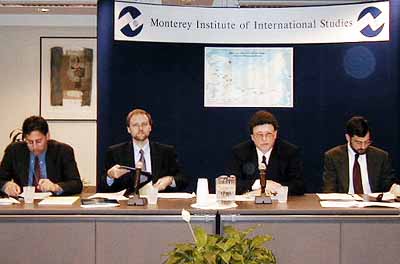March 19, 2001

Analysts on regionalism in Russia
On March 19, 2001, the Newly Independent States Nonproliferation Program (NISNP) at CNS held a workshop on the topic of “Russian Nuclear Regionalism and US Policy” for policymakers, non-governmental analysts, and journalists in Washington, DC. The audience included representatives from the US Departments of Energy, State, and Defense, as well as analysts from a number of leading nonproliferation non-governmental organizations (NGOs) and research institutions. The purpose of the workshop was to share initial findings from an on-going two-year project being conducted by NISNP in conjunction with analysts from the Moscow-based Policy Studies in Russia (PIR) Center. This project focuses on how the waning of central controls in Russia and the rise of regionally based political and economic forces complicate weapons of mass destruction nonproliferation and nuclear safety issues.
Presentations by NISNP and PIR Center experts at the Washington workshop focused first on overarching issues related to center-periphery relations under President Vladimir Putin and the role of Minatom and the Russian military in the regions. A special luncheon session, featuring former senior Department of Energy official Rose Gottemoeller, analyzed lessons from US nonproliferation assistance programs in Russia’s regions. The workshop’s afternoon session included detailed examinations of political and economic conditions at nuclear facilities in those regions of Russia with the most significant nuclear infrastructures: the Kola Peninsula and Northwest, the Far East, the Chelyabinsk and Sverdlovsk oblasts in the Urals, Krasnoyarsk krai in Siberia, and Nizhny Novgorod oblast in the Volga region. A final session, moderated by CNS Deputy Director Leonard Spector, discussed implications for US policies regarding Russia.

Left to Right: Dr. Adam Stulberg, Dr. Vladimir Orlov
Dr. William Potter, and Dr. Clay Moltz
The workshop participants and speakers agreed that while Moscow continues to play the dominant role in controlling regional nuclear facilities, there are a number of region-specific factors now influencing both nuclear decision-making and the implementation of specific policies for future US assistance programs in Russia. Comments provided on the papers from those attending the workshop will be incorporated into the final drafts of the various studies, which are to be completed in late spring 2001. During summer 2001, project members will develop specific policy recommendations informed by their case studies. The PIR Center and CNS analysts plan to hold a workshop for Russian government officials and NGO analysts in fall 2001 in Moscow. Final project findings and recommendations will be disseminated to US and Russian decision-makers, experts, and the media in spring 2002. A collection of the project’s studies and recommendations will be published as an edited book in late 2002.
Agenda
| 9:00-9:15 | Welcoming Comments | Dr. William C. Potter, CNS Director Chair: Dr. Clay Moltz, NIS Program Director, CNS |
| Nuclear Regionalism in Russia: Issues and Trends | ||
| 9:15-9:30 | Overview | Dr. Vladimir Orlov, Director, PIR Center, Moscow |
| 9:30-9:45 | Putin’s Federal Reforms | Dr. Adam Stulberg, CNS Postdoctoral Fellow |
| 9:45-10:00 | The Impact of Center-Periphery: Relations on Nuclear Policy | Dr. Nikolai Sokov, CNS Senior Research Associate |
| 10:00-10:45 | Discussion | |
| 10:45-11:00 | Break | |
| Federal Nuclear Agencies and the Regions | ||
| 11:00-11:15 | The Military and Russia’s Regions | Dr. John Lepingwell, CNS Senior Scholar-in-Residence |
| 11:15-11:45 | Minatom’s Control Mechanisms: Minatom’s Regional Policy | Dr. Igor Khripunov, Associate Director, Center for International Trade and Security, University of Georgia Dr. Sonia Ben Ouagrham, CNS Senior Research Associate |
| 11:45-12:30 | Discussion | |
| 12:30-1:00 | Lunch | |
| 1:00-1:30 | Lessons from U.S. Nonproliferation Assistance Programs in Russia’s Regions | Speaker: Rose Gottemoeller, Senior Associate, Carnegie Endowment Chair: Leonard Spector, CNS Deputy Director |
| 1:30-1:45 | Discussion | |
| Nonproliferation Issues in Russia’s Regions: Case Studies | ||
| 1:45-2:00 | Far East | Cristina Chuen, CNS Research Associate |
| 2:00-2:15 | Discussion | |
| 2:15-2:35 | Northwest and Volga/Central Regions | Ivan Safranchuk, PIR Center Research Associate |
| 2:35-3:00 | Discussion | |
| 3:00-3:15 | Break | |
| Regional Case Studies (continued) | ||
| 3:15-3:30 | The Urals | Elena Sokova, CNS Research Associate |
| 3:30-3:45 | Discussion | |
| 3:45-4:00 | Siberia | Dmitry Kovchegin, PIR Center Research Associate |
| 4:00-4:15 | Discussion | |
| 4:15-5:15 | U.S. Policy Options and Russian Regionalism: Closing Discussion | Chair: Leonard Spector, CNS Deputy Director |
| 5:15-6:00 | Reception and Informal Discussion | |
CNS thanks the Smith Richardson Foundation and the Ploughshares Fund for grants in support of this project, as well as the following foundations for general support grants that fund CNS work concerning the former Soviet Union: the Carnegie Corporation, the Ford Foundation, the W. Alton Jones Foundation, the John D. and Catherine T. MacArthur Foundation, the John Merck Fund, the Prospect Hill Fund, and the Scherman Foundation.
